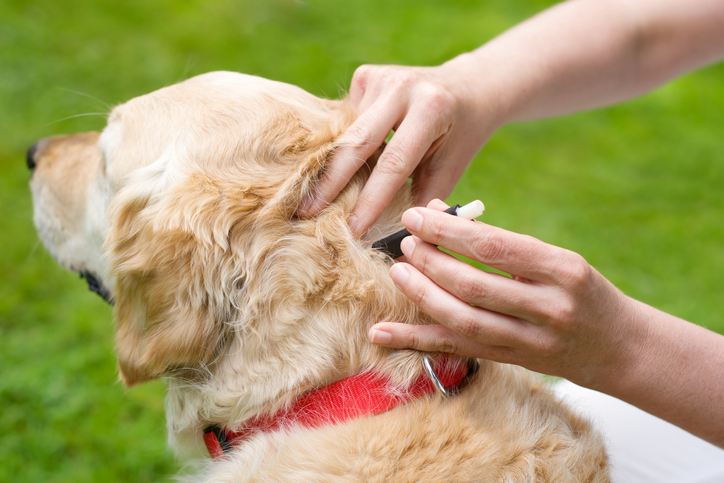6 Tips to Keep Your Dog Tick-Free This Summer in Plymouth Meeting, PA
Keeping your dog tick free is one of your most important jobs as a pet parent. Tick bites are serious, as they pose a risk to your pup’s health and often present with painful, debilitating symptoms.
You can keep your dog tick-free using excellent, safe, and effective preventive medicine. You should also regularly mow your grass and groom your dog. Checking for ticks every time your pup comes in the house from being outside is the ideal way to ward off tick bites.
Ticks need high humidity to thrive, so they are often found in tall grass and vegetation during the summer. Are you interested in discovering six tips for keeping your dog tick-free this summer? Read this informative article.
What Are the Diseases Ticks Can Give Dogs?
It is essential to know that tick-borne diseases can be fatal in dogs, which is why it is a good idea to be informed by learning how to prevent ticks and being aware of what conditions can affect your pet:
- Lyme disease– This is the most common tick-borne illness. Lyme disease can cause joint pain and inflammation. Luckily, there is a vaccination to prevent it
- Canine Ehrlichiosis- This can lead to anemia. Signs can start 1 to 3 weeks after the initial tick bite
- Anaplasma- This causes symptoms similar to Lyme disease. It can also cause bleeding disorders.
- Rocky Mountain spotted fever- This disease was initially discovered in the Rocky Mountain States. Symptoms often start with a fever, lack of appetite, and inflammation.
Above is the most common tick-borne disease in dogs. Some others include Babesiosis, Bartonella, and Hepatozoonosis. If not treated in time, these can have serious health consequences.

Six Tips to Keep Your Dog Tick Free
Ticks are rampant during the summertime and are a real problem, as they tend to carry diseases. Unfortunately, ticks will gravitate toward your canine companion for a tasty snack. For this reason, you need to keep ticks off your canines and out of your yard and home.
The following are tips that will help you keep your pup tick-free:
1) Find Out Where Ticks Live
Ticks live in shady, moist areas, typically at ground level, where vegetation is present. They love the warmth and humidity of the summer months. Some ticks, like the America Dog tick, live in tall grassy areas. A few tick species, like the brown dog ticks, will thrive indoors and live in dog kennels, couches, and the sections between the walls. The ticks to watch out for and where they live:
- American Dog Tick- Southeast of the Rocky Mountains
- Black Legged Tick- Commonly found on the east coast
- Brown Dog Tick- Found throughout the entire country
- Asian Longhorned Tick- Most commonly found along the eastern Atlantic coast
- Lone Star Tick- Found mainly in the south but is now spreading through the east and northeast
Ticks seek out their host by hiding in low-lying areas, most commonly in the grass. Some animals, like the white-footed field mouse, frequently carry ticks. Dogs may be curious when they see a mouse and, through direct contact, become infected with Lyme disease. Keep your dog away from shrubby or grassy areas during the tick season.
2) Regularly Mow the Lawn
You can help prevent ticks from entering your yard if you keep it neat and well-mowed. Ticks do not typically live on mowed lawns because they cannot hide or sneak onto an unsuspecting host. Regularly mowing the lawn helps rid your yard of ticks. Some of the reasons why cutting the grass get rid of ticks:
- Ticks Cannot Hide in Short Grass- There is not enough space for ticks in short grass, and they cannot effectively latch onto prey
- Lawnmowers Kill Ticks- The mower slices and dices through any bug or insect that dares to cross its path
- Your Dog Will Not be Bitten So Easily- Ticks thrive in areas where tall weeds grow. Short grass does not entice these tiny arachnids.
It is not common for ticks to live on a well-mowed lawn. You should mow the lawn down to 2.5 inches for the best results. Eliminating weeds is also highly effective in ensuring that the ticks do not have an ideal hiding spot to ambush your pup.
3) Frequently Check for Ticks
When your dog comes in from outside, you should check them for ticks. This hypervigilance can help protect them from tick bites. Run your fingers through their fur and feel for any unusual or hard bumps within the skin. Pay special attention to the following areas:
- Near the underbelly
- Between each toe
- Around the tail
- Paw pads
- Ears
- Eyes
- Mouth
- Neck
Ticks can be difficult to identify but become larger as they feed off their host. They look like specks of dirt or coffee grounds stuck in the skin.
You can try gently pulling the tick out of the skin with tweezers, or if you are not confident that you can accomplish this without further embedding the tick deeper into the skin, take your pup to the vet immediately. They can also test to see if the tick carries any disease that can harm your dog.

4) Use Tick Prevention
You can choose from some great tick and flea preventatives that will help, such as monthly oral or topical medications you can give them. Vets often recommend Credelio chews for dogs. If a tick gets on them and bites, the medicine in the pup’s bloodstream is transferred to the tick, and the tick dies before they get the chance to infect your dog with any harmful diseases.
You should also be wary of flea and tick collars that contain chemicals your pup could accidentally consume by licking the residue found on the hair. When ingested, the chemicals in flea and tick collars are highly toxic, and using them is unsafe. The best preventatives are the ones that your dog takes orally or is topically applied and veterinary approved. Talk to your vet about flea and tick preventatives.
5) Keep Your Dog Well-Groomed
Groom or brush your dog at least once a week to prevent pests from accessing your pup’s fur. Grooming your dog’s coat will help to find ticks in their fur. You may also treat your pup to a fun trip to the groomer. Groomers may utilize special shampoos that can help prevent fleas and ticks.
6) Have a Well-Maintained Home
If, by slight chance, a tick enters your humble abode, it can start laying eggs, which is a real problem. Use your vacuum to suck up ticks, especially when your dog comes in from outside. You should also seal up the cracks, crevices, or openings in your home’s exterior.
Keeping your home well-maintained decreases the chance that ticks will infest your dog. Vacuum at least once weekly to ensure any pesky visitors have cleared away. Run the vacuum over the whole floor, and know that certain ticks, like brown dog ticks, are attracted to homes that are not well-maintained.
Conclusion
Tick-preventative medications are the best defense for your dog against tick-borne infections like Lyme and Rocky Mountain spotted fever. Other potential solutions include keeping your grass short and grooming your dog. Check your pup for ticks whenever they come in from being outside. Talk to your vet about the best options for your dog.
For dog parents in the Plymouth Meeting, PA area, The Village Vets are available to serve you and your dog. Call us today at (484) 820-1700 or make an appointment!
Recent Posts
About The Village Vets
The Village Vets of Plymouth Meeting offers excellent service to clients in a comfortable, friendly atmosphere. To learn more about us and how we can better serve you and your pet here in Plymouth Meeting, PA, click the button below.
Share This Post
Recent Posts
About The Village Vets
The Village Vets is a network of three animal hospitals based in Atlanta, GA and the surrounding area. We offer honest, excellent service to our clients in a comfortable, friendly atmosphere. To learn more about our locations and how we can better serve you and your pet, click the button below.




